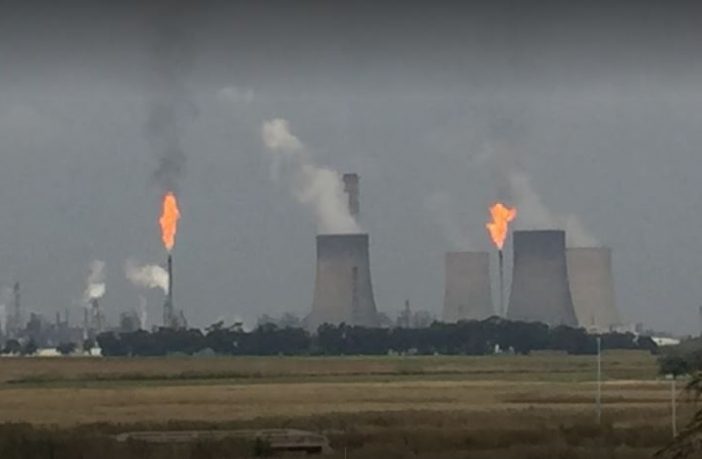- South Africa’s petrochemicals giant Sasol, the worlds largest greenhouse gas point source emitter, has released a trading statement for the six months ended 31 December 2023.
- It does not look good for the fossil fuel powered behemoth whose leadership has failed to grasp the value to be unlocked in transitioning to cleaner sources of energy in good time.
- They continue to appeal an air quality standard ruling and recently sucked up a R35,3 billion impairment on their carbon emissions billowing Secunda Plant. Read more
Sasol’s reports that their financial results for the six months ended 31 December 2023 were negatively impacted by the continued volatile macro-economic environment, with weaker oil and petrochemical prices, unstable product demand and ongoing inflationary cost pressure.
Despite some operational improvements in South Africa, persistent underperformance of the state-owned enterprises involved in Sasol’s value chain and the weaker global growth outlook continue to impact Sasol’s business performance.
Related news: Sasol avoids climate protestors with virtual AGM as share price continues to tumble
Sasol’s adjusted earnings before interest, tax, depreciation and amortisation (adjusted EBITDA*) for the six months ended 31 December 2023 are expected to be between R26,2 billion and R29,4 billion compared to the prior half year adjusted EBITDA of R32,0 billion (representing a decrease of between 8% and 18%).
Shareholders are advised that, for the 2024 financial half year:
- Earnings per share (EPS) are expected to be between R13,33 and R16,58
compared to the prior half year EPS of R23,23 (representing a decrease of
between 29% and 43%) - Headline earnings per share (HEPS) are expected to be between R17,90 and
R22,22 compared to the prior half year HEPS of R30,90 (representing a
decrease of between 28% and 42%); and - Core HEPS (CHEPS**) are expected to be between R16,43 and R19,86
compared to the prior half year CHEPS of R24,55 (representing a decrease of
between 19% and 33%).
The financial information underpinning this trading statement has not been reviewed and reported on by the Company’s external auditors. Sasol will release its 2024 interim financial results on Monday, 26 February 2024. Sasol’s President and Chief Executive Officer, Fleetwood Grobler, and Chief Financial Officer, Hanré Rossouw, will present the results at 09h00 (SA time) on 26 February 2024, followed by a market call to address questions.
Institutional investors pulling out
Leading up to the botched AGM in November, Sasol publicly criticised Old Mutual Investment Group (OMIG), one of its biggest shareholders, for pre-declaring its intention to vote against Sasol’s 2023 “say on climate” resolution. Sasol stated that OMIG “appears to have placed significant reliance on the Just Share report without proper consideration and/or recognition of any of Sasol’s recent disclosures and assertions made in response, which point to factual inaccuracies contained in Just Share’s report”.
Ninety One has also pre-declared its intention to vote against Sasol’s climate change resolution. Although Ninety One’s concerns are similar to those of Just Share and OMIG, Sasol has not alleged that Ninety One placed improper reliance on Just Share’s briefing in making its decision not to support Sasol’s climate plans.
Related news: Sasol reaches new frontiers in air pollution – pumps out more emissions each year than entire countries like Portugal
Author: Bryan Groenendaal















